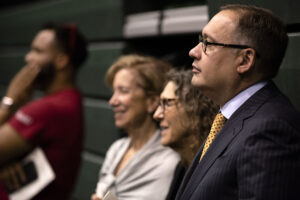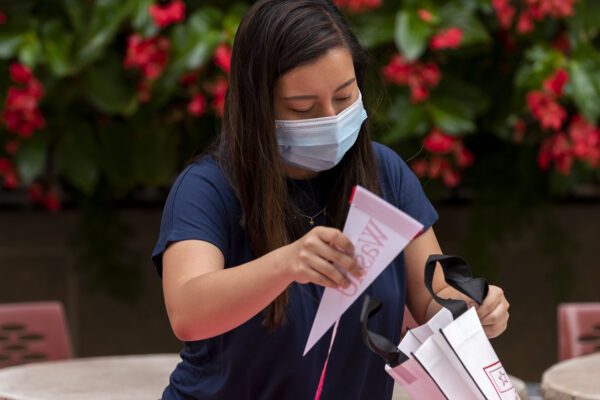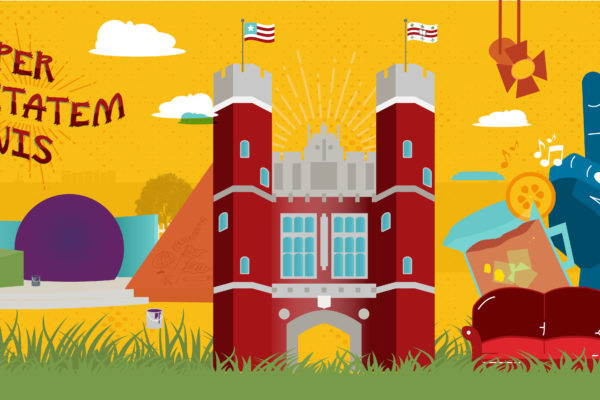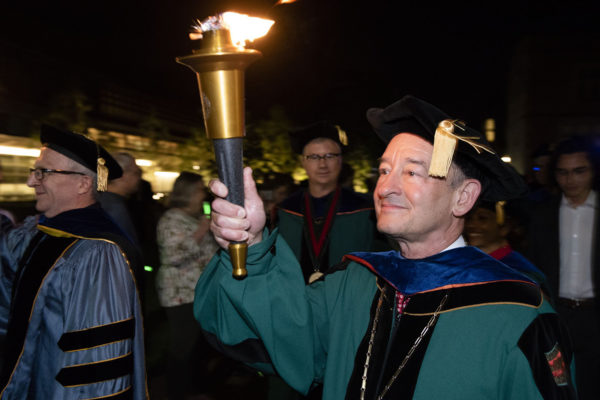When the Washington University in St. Louis Class of 2023 arrives Aug. 17, a Saturday, they will experience a nine-day Bear Beginnings orientation program that is more inclusive, more fun and, yes, more days.
Traditions such as Convocation, SUp All Night and the Common Reading Program discussion will continue. But Bear Beginnings also will include new programs such as immersive experiences in St. Louis, a residential life block party and “Dialogue Across Difference,” a workshop introducing students to university values of free expression and inclusion.
“Orientation has always been a terrific introduction to WashU, but we hope the new Bear Beginnings will provide students an opportunity to make stronger connections to their school, the St. Louis community and, most importantly, to each other,” said Katharine Pei, director of the First Year Center.
Students will arrive Aug. 17. To prevent traffic jams, students will be assigned a time slot during which to arrive. More than 300 students and staff will be on hand to haul mini fridges and comforters into the residential colleges.

As in years past, Convocation will take place that evening at the Athletic Complex. This will be Chancellor Andrew D. Martin’s first Convocation, and he has some surprises planned for the ceremony and the following party, which will take place in the newly completed Ann and Andrew Tisch Park.
Pei said the move to Saturday will enable more parents to participate in move in and Convocation.
“For many parents, it is difficult to miss work during the week,” Pei said. “The new schedule will better serve their needs. After all, this is a big day for parents, too.”
Another change is the elimination of pre-orientation programs, which were popular but not accessible to all students, even after the university waived the fees for low-income students.
“We wanted to give everyone the same excellent welcome into the university,” said Rob Wild, associate vice chancellor for student affairs. “Before, you had a significant fraction of students who had the opportunity to make friends and connections through pre-o and the rest who arrived and didn’t know anybody. It was a priority to fix that while still giving students the benefit of smaller group experiences.”
Those group experiences will take place Aug. 19-24. Students will first participate in three days of academic experiences programmed by their respective schools, followed by a three-day “immersive experience” in either the arts, community engagement, entrepreneurship or leadership.
Colleen Smyth of the Gephardt Institute for Civic and Community Engagement said the immersive programs will introduce students to campus resources and the St. Louis community. She is organizing Engage STL, an immersive experience that will feature visits to St. Louis neighborhoods, the Griot Museum of Black History and the Festival of Nations as well as a service project at the Greenwood Cemetery.
“As a new college student, it’s easy to see campus as your home,” Smyth said. “But St. Louis — its people, its history and its assets and challenges — also is part of the Washington University experience.”
As in prior years, all students will participate in a Common Reading Program discussion with their floor. This year’s book is “Hate: Why We Should Resist It with Free Speech, Not Censorship,” by Nadine Strossen, a law professor and past president of the American Civil Liberties Union.
Students also will attend “The Date,” a sexual violence prevention program, and “Our Names, Our Stories,” which explores Washington University’s diverse and inclusive community. Both productions are written and performed by students.
New this year: “Dialogue Across Difference,” a workshop that explores the meaning and practice of freedom of expression and inclusion. Lori White, vice chancellor for student affairs, launched the program to provide students with strategies for having meaningful conversations.
“At Washington University, we strive to educate a generation of students who can lead our diverse society,” White said. “But to lead, we must be able to talk to one another. That’s not always easy for students, many of whom come to us from relatively homogeneous neighborhoods. By exploring the values of freedom of expression and inclusion and providing tools students can use in their daily conversations, we hope this program helps them better engage with people who are different from them.”
In the evenings, students may choose to attend various events, such as a men’s football or women’s soccer scrimmage, open house for various cultural groups, on-campus performances and a trip to the City Museum. The fun wraps up Aug. 25, the day before classes begin, with a pep rally, class photo and Ted Drewes frozen custard.
Wild said the mix of programming — some mandatory, some not; some academic, some social — provides breathing room and balance. Bear Beginnings is longer than its previous four-day incarnation, but not by much, considering that pre-orientation participants arrived eight days before classes began.
“We were hearing that there was too much to do in those four days, so by the time students got to class, they were stressed out,” Wild said, noting that many peer institutions also have extended orientation. “The new schedule allows our students to ease into life at the university.”



